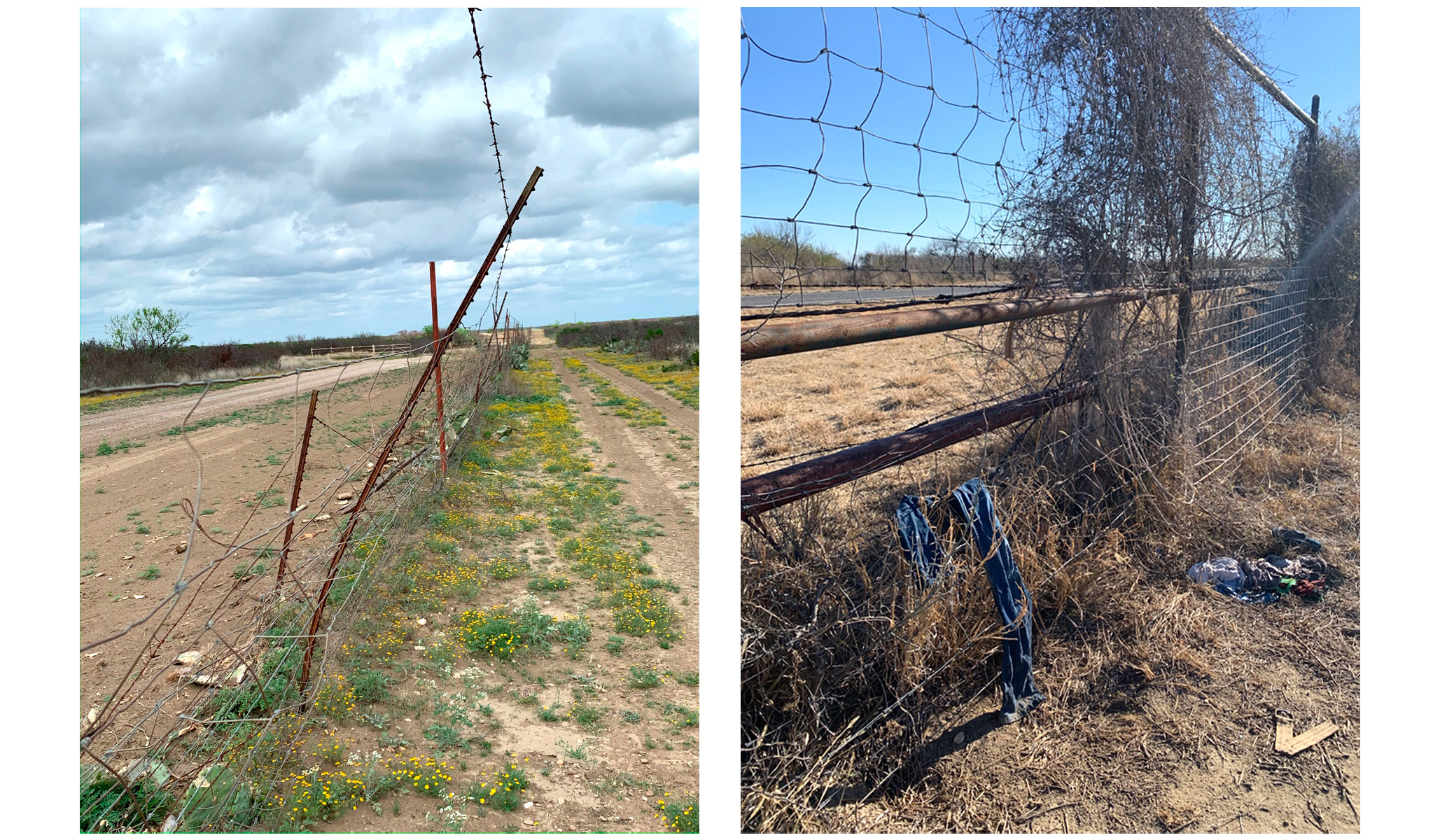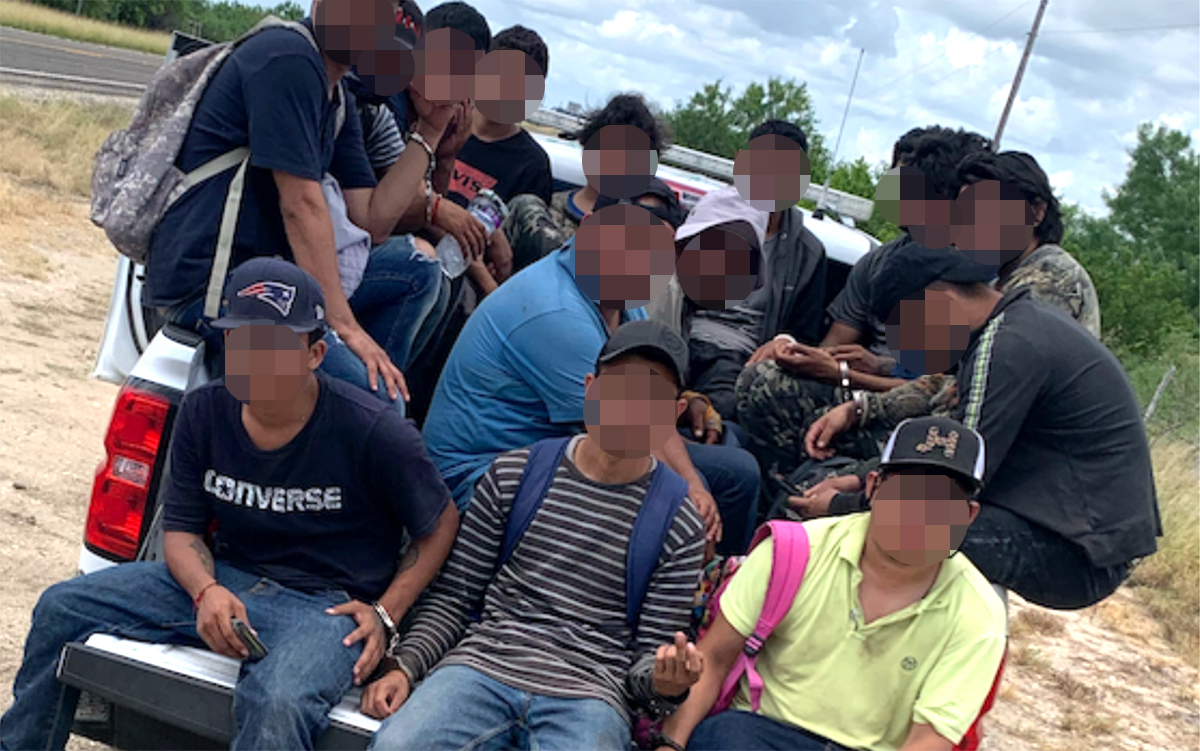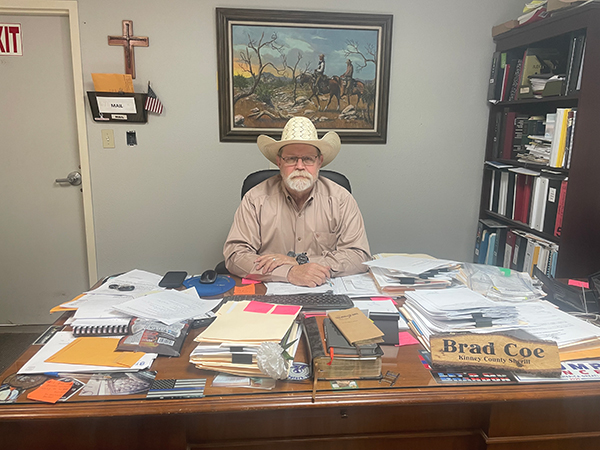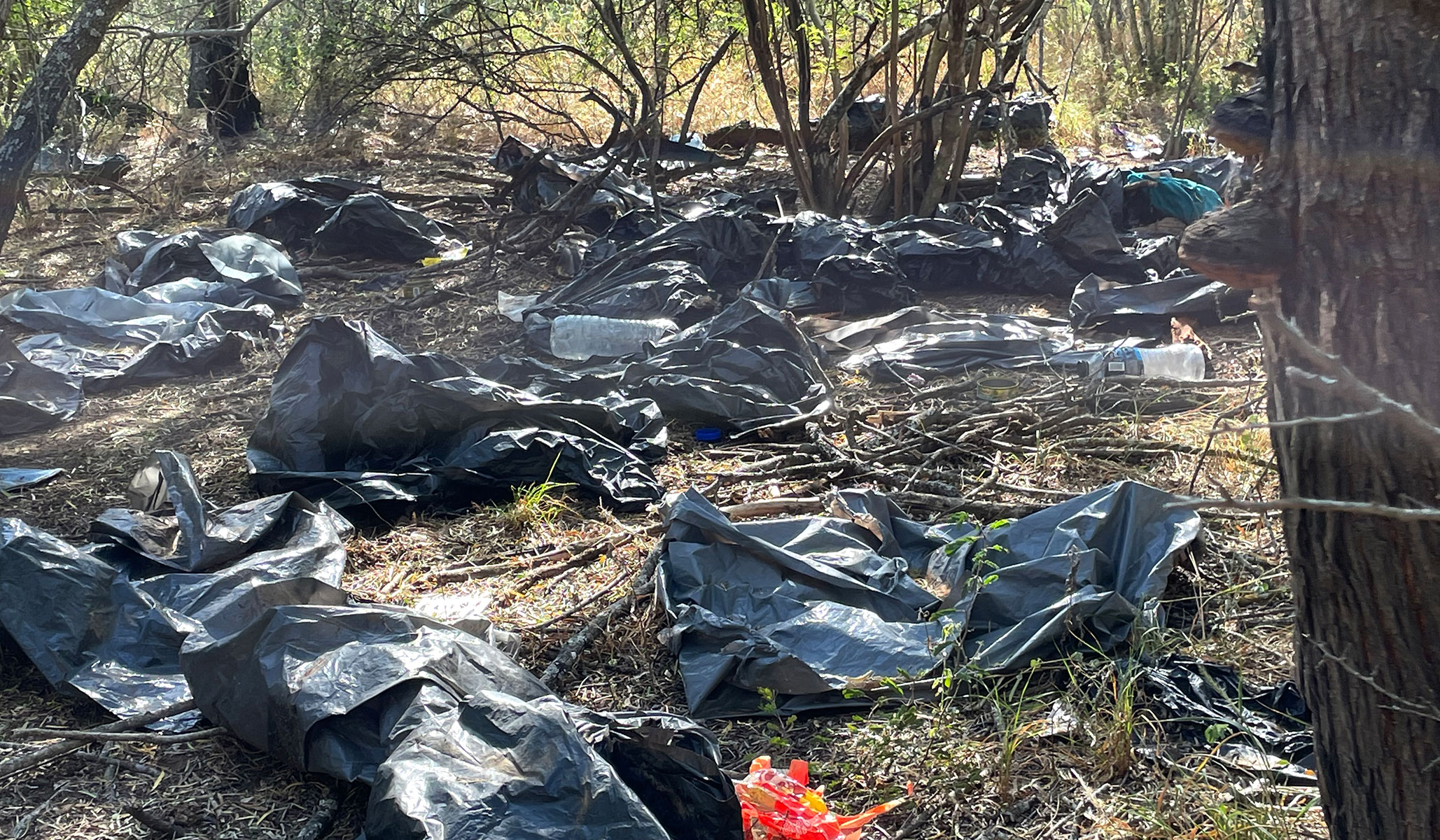Breaking: Nightmare on the Border: Locals Left to Fend for Themselves as Migrant Surge Overruns Ranches, Towns
- Get link
- X
- Other Apps
When I pulled up to Harris Ranch, I was startled by the barking of three large Blue Lacys, the state dog of Texas. They ran up to my car as it was moving, only backing off when called by their owner.
John Sewell, owner of the ranch near Uvalde, Texas, said his Lacys help ward off some would-be thieves. But the dogs can only do so much. He and Jim Volcsko — a friend and former Customs and Border Protection officer who now works at the ranch — are in a daily battle to keep up with the damage caused by the flow of migrants trekking up from the border 50 miles away.
Trash, stolen property, cut fences, trampled fences (a big problem on a livestock and hunting ranch), and, most frustrating of all, broken water lines are just some of the problems they face. "Water is the life of south Texas," Sewell said. "They’re turning our water off and breaking our water [lines]." To stay on top of the damage, he told me, is "a full-time job."
Another nearby ranch owner in Maverick County, who wished to remain anonymous, shared that last year, he lost 130,000 gallons of fresh water and endured "more property damage than if I were to add 30 years together."

Sewell and Volcsko, who manage over 30,000 acres of land dedicated to livestock and commercial hunting, have seen their land overrun by migrants crossing the border illegally, many smuggled and some likely trafficked. Just that morning, they told me, a group of 15 migrants passed through: "Every night when you go to bed there’s 15, 20, 30 guys potentially walking right through your yard."
There's one certainty for these south Texas ranchers: Migrants are always crossing. When I asked Volcsko for a total count, he said: "There’s no ability to put it to numbers."
Their accounts are just a snapshot of the burdens that locals in south Texas face as migration traffic surges and stands to get worse with the looming rollback of Title 42. Ranchers like Sewell and Volcsko have been grappling with theft, escaped livestock, property damage, and threats to their families' safety. As their business struggles, their counties' overall economies are suffering and their communities are getting overwhelmed. Tragically, local officers are also dealing with a rising body count as migrants perish on their harrowing journeys north in the sweltering Texas sun. The Maverick County rancher told me, "I had more dead people out here [last year] than I’ve ever had."
Migrant traffic and a diminished Border Patrol presence are taking a significant financial and operational toll on Sewell, Volcsko, and their community. "It’s very uneasy, every day having to deal with endless numbers [of migrants]," Sewell told me, "And it’s not like they have regard for what we do. They don’t have regard for our property."
This shoe was found on Harris Ranch, John Sewell's home. He deals with hundreds of smugglers taking migrants across his property every week. The shoe has a special cloth sewn to the bottom to reduce the appearance of footprints. pic.twitter.com/QLYs6qqAU3
— Carine Hajjar (@carinehajjar2) April 15, 2022
The Maverick County rancher, who's suffered thousands of dollars of damage to just his fences, said people have thrown rocks at him and beaten his dogs with sticks. One migrant flipped him off as he was taken away by Border Patrol in the fourth truckload of the day.

He showed me the miles and miles of trash left on his property by passing migrants.
Helicopter footage of the trash left by migrants on a Maverick County, Texas ranch. Video courtesy of the ranch owner who wishes to remain anonymous. pic.twitter.com/aogcZjsXr3
— Carine Hajjar (@carinehajjar2) April 20, 2022
"[They've] smashed in windows, burned up centrifugal pumps, cut holes in 300-gallon water-storage containers," he said. His hunting blinds, which are integral to his business, cost $3,500 to $5,000 and have been destroyed. "Nobody's reimbursing us for anything," he told me.
The rancher, just like Sewell and Volcsko, said that property damage and migrant crossings have significantly escalated in the past year. They attribute the crisis to the White House's policies.
Not that this was a surprise to Volcsko, who left Border Patrol when he suspected a Biden win: "As soon as the election went sideways, I just let my [retirement] paperwork slide." The rancher said that this administration's policies are "100 percent" responsible for the crisis on his land: "They’re the ones that changed everything."
The migrants coming through these ranches generally are not asylum-seekers. "If they’re looking for asylum, they should just throw their hands up at the border. They’re gonna get a free ride," said Sewell. A Texas Department of Public Safety officer checking on Harris Ranch told me that these are "people that don't want to get caught."
The state officers routinely check on Sewell and the Maverick County rancher's land as a part of Governor Greg Abbott's Operation Lone Star, through which DPS and the Texas National Guard are sent to the border. On a ride-along, Sergeant Juan Maldonado, a DPS officer, told me that the mission is meant to "support the citizens of the state of Texas in providing security for all the criminal trespassing that is going on to the ranches, destroying property."
With Title 42 — a pandemic-era measure that's allowed the government to turn back some asylum-seekers — in place, Border Patrol mostly turns Mexican and Northern Triangle nationals back into Mexico. They also turn away migrants with criminal records. Though enforcement varies, others, including most family units, can apply for asylum, overwhelming the system. According to the New York Times, the criteria for being "permitted to stay" despite Title 42 "has varied day by day or even hour by hour, as well as from one border crossing to the next." In March alone, border agents processed migrants 221,303 times, exceeding the previous record of 213,593 under Biden last summer.
Many of the migrants I personally met were Venezuelans and Cubans. There's also been a major influx of Haitians. This group — the asylum-seekers — are earnestly looking for opportunity. They spoke of "el sueño Americano," many hoping to work and send money home to their families.
With Border Patrol dealing with mounting asylum claims, though, much of the border remains unattended. "The agents want to work," the DPS officer on Harris Ranch said, "but their upper management . . . got them changing diapers." A more criminal element is all but invited to enter.
The Maverick County rancher shared that smugglers are bringing along unknowing victims: "There are some good people that by all means are trying to improve their lives." He said he's helped women and men who have been raped as they're smuggled north.
On April 18 in the town of Uvalde, just 60 miles from the border, local law enforcement intercepted three vehicles carrying 19 undocumented migrants engaged in human smuggling. Busts like these are weekly — if not daily — occurrences for the Uvalde PD.
But Border Patrol is the only entity that can detain and process illegal immigrants long-term. So when properties are overrun with migrants, Sewell and the DPS alike have to sit and wait with migrants for border agents. Or, they have to let the migrants go.
The Maverick County rancher said that in early April, he encountered 80 migrants, all men. He was told to let them walk. "Border Patrol had no one to send . . . because they’re all processing," he said. "It’s happening every day."
South Texas ranchers are left to fend for themselves.
Sewell has his wife and daughter carry guns when they go outside. Volcsko trained his wife to use a gun so that she's protected when she drops off lunch and he's out in the field.
Just in the last month, Sewell told me he's called for help 20 times when he's encountered a migrant group. "They have not responded once."
The situation is so dire that sometimes it's Sewell helping Border Patrol. He grew visibly frustrated when he told me of a recent incident with the agency. "I got called at 2:30 in the morning . . . because they had a call from some illegal immigrant dialing 911 that was lost, cold, and needed assistance" on his land. "They wanted me to help them go up there and get [the migrant]." It's a harsh reality: "You’re not going to come get them when I . . . an American citizen calls."
Local police departments, meanwhile, are scrambling financially and operationally to keep their citizens safe.
Uvalde, like other border communities, is facing an increase in "bailouts," or high-speed chases of smugglers by the police. Bailouts are particularly dangerous because they usually occur in residential areas as smugglers endeavor to be more evasive. Don McLaughlin, mayor of Uvalde, told me that he's had to shut down schools 48 times in the past year to avoid dangerous crashes. He told me that the smugglers who are driving have "no care for human life," as we toured around Uvalde Estates, a residential neighborhood in his town, and nearby schools:
Uvalde Estates, a majority Hispanic community. Many migrants "bail out" here, meaning they try to outrun police vehicles. Often, "bail outs" end in crashes on private property. pic.twitter.com/L1uon78qQL
— Carine Hajjar (@carinehajjar2) April 12, 2022
Local police departments, tailored to these small-town Texas counties, are facing rising costs and major strain on their infrastructure.
Brad Coe, sheriff of Kinney County, is struggling to keep up with criminal activity. "My deputies are just trying to keep their heads above water. We’re working twelve-, 14-hour days, six days a week." With just six deputies, he had to manage 527 criminal charges since January. Many cases are smuggling-related. He told me that when he took office six years ago, he got about three smuggling cases a month. As of April 14, the county has processed 25 smuggling cases for the month, according to Coe. Kinney County is home to only 3,600 inhabitants.

Meanwhile, his local economy is suffering. He explained that Kinney County, which has one gas station, one grocery store, and handful of mom-and-pop restaurants, relies on the taxes of ranchers who host commercial hunting and raise livestock.
But migrant trespassers disturb the hunts, allow game to escape through broken fences, and ultimately shrink ranches’ profit margins. "If the hunters don't come back, we lose our gas stations and grocery stores," said Coe.
The danger from surging illegal immigration cuts both ways, however, as locals are reminded too often.
Sheriff Coe said he's had two migrant drownings and one heat-stroke death so far this year. Those numbers are likely to climb into the summer months, especially after Title 42 is repealed next month.
Many of these bodies are called in by local ranchers. The Maverick County rancher shared that he found six bodies last year, but "who knows what's out there in the brush."
Small counties on a tight budget are struggling to even afford burials. Coe said that handling each body costs the county about a thousand dollars between the fee from the mortuary that retrieves the body and the burial in cases where the relative cannot be contacted. If there's any suspicious element, the county has to pay more for an autopsy.
A body discovered in the brush, then, becomes a financial burden for the local government, the messy governmental transactions one final indignity for the migrant and his family, if they ever even learn what happened.
Migrants are dying en route, and "family members don't know if they made it or not," Coe said. The damage from the border breakdown, he noted, "strikes both sides."
| |
| THIS BREAKING NEWS ITEM IS PRESENTED BY  |
| |
| ||||||||||||||||||||||||||||

- Get link
- X
- Other Apps





Comments
Post a Comment